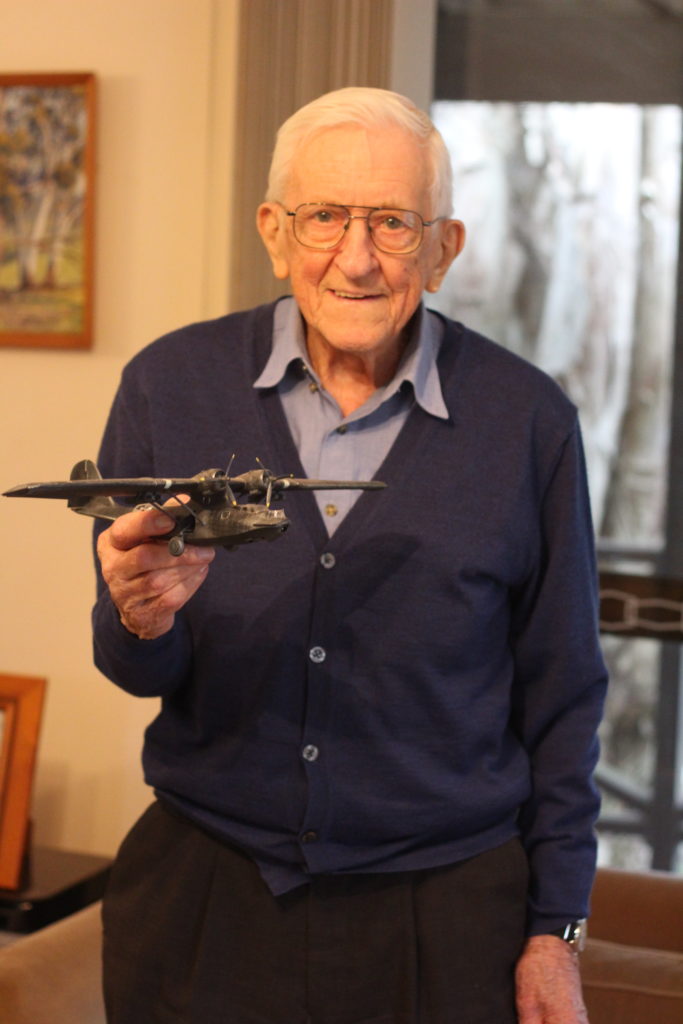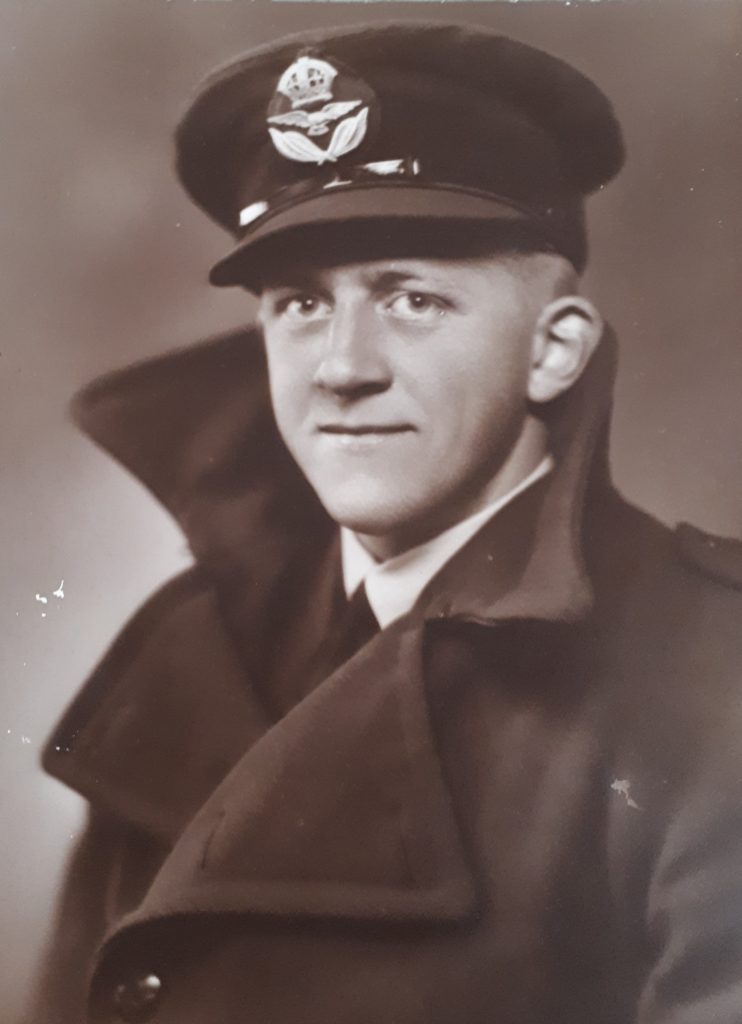Dick Udy couldn’t wait to enlist when war was declared in 1939. His sense of adventure was eventually fulfilled as a wireless operator onboard the “Black Cats” Catalina flying boats, mining and bombing Japanese strongholds and harbours under the cover of darkness, at very low altitude. Here he tells his story…
In 1939 I was not quite 18 but like most young boys at the time I was keen to join up, so I rode my pushbike all the way from Maitland, where we were living, to Newcastle to find the right place to enlist. I wanted to go into the Air Force, I thought it would be far more exciting than marching around in the Army!
I was eventually called up, heading to Bradfield Park in Lindfield, Sydney. I trained to be a wireless operator and spent 6 months undertaking elementary training out at Parkes, followed by a month of gunnery training in South Australia. We were then sent to Rathmines, near Newcastle, to practice all the dangerous and normal things on the Catalinas – the flying boats that we were going to fly in the Pacific.
When we arrived at Rathmines a Corporal came along and grabbed a few of us saying, “you’re down for a funeral duty tomorrow”. A Catalina practicing a rough water landing had crashed just outside Newcastle Harbour that very day and all the men had died. We just accepted it, that was life. So we went out the same day and had the funeral service, and that was the beginning of Catalina training.

From Rathmines we were sent north to Cairns, then the Gulf of Carpentaria, then Darwin after it was bombed. Darwin remained our base for the rest of the war.
The skipper of my crew was Reg Marr. He was careful, he was brave, he was athletic, he had all the qualities you could imagine a person needed to be a good skipper. We had two pilots and sometimes a third who was learning. The navigator was the hardest worked, he was on his own and he was very important. On a long flight he’d be rushing up and down, getting star fixes as to where we were. If he made a mistake of a degree or so, you’re going to finish up a long, long way off. There were two wireless operators. We all got on tremendously well, it was very fortunate. You spend hours and hours together with your crew, doing things and facing unusual circumstances.
As a wireless operator silence was the rule, but the chatter in your ear from base was vital. We had very little information on the sea areas north of Australia, all of that area was completely unmapped, some planes even flew into mountains without knowing they were there. We were always flying low, that was our biggest danger, especially at night. We flew the Black Cats, painted completely black so at night we were invisible. We didn’t have any lights on in the plane so as to remain as hidden as possible.
We were in 43 Squadron, which was a good squadron. In the early days it was high level, 10,000 – 12,000 feet bombing of Japanese outposts. They were villages and I didn’t like that. That was the one time I felt uncomfortable. It wasn’t long after that we started deep sea mining. This meant that we would carry two 1,000 pound mines, one under each wing, for hours on end. We would fly from Darwin to Broome, load up the bombs and head up from there. They were all long journeys, whatever the location. You got used to that, as long as people weren’t trying to shoot you out of the sky.

The mining meant the enemy couldn’t take their vessels through a canal or channel in the harbour, effectively stopping their supplies, their soldiers and their food. By the end of the war, their soldiers had completely run out of supplies, including food.
I had a “she’ll be right, we can do this” attitude which kept me going right through the war, and we were kept busy. There was no time to sit down and say “another bunch has gone”. But I lost my best friend, he was blown out of the sky at Balikpapan. He had been asked to go as a special pilot on this plane and come in at 20 feet, just above the trees. We were mining the harbours and the channels and that morning one of the officers came to him and said “Look we need you to go with this young crew today”. They were very, very young, they’d only just arrived in the squadron about a fortnight and so he quite willingly went as second pilot. We had done our tour and flown all the way around when one of the boys in my little cabin said, “flames in the harbour, skipper” and that was my best friend. So there are times like that, I couldn’t tell at that point who it was, but it turned out to be him.
I’ve written a poem about it, called Flames in the Water.
It’s an Air Force superstition, don’t get yourself transferred from one crew to another if you can possibly handle it, and for him it turned out to be true…
We also conducted rescues of other crews who came to grief, and we gained a bit of notoriety for one rescue in particular. We’d been out mining all night and came back on a Friday morning. There was hardly anybody in Darwin Harbour and in came the message, one of our Beaufighter planes had crashed on Cartier Island, a tiny sand spit that is barely anything. At high tide it’d be covered. There was nobody else to go, we were all dog tired, but the skipper got in as much petrol as he could. Petrol was the key with the timing and it was about 500 miles west of Australia. We got there just on dusk and you could see this little wreck of a plane and 2 figures wandering around. We had to land. The most difficult thing in Catalinas is landing in rough water, but Reg was a remarkable pilot and he came around on the lee side. He did a stall landing, where you come down as low as you can, turn the engines off and absolutely drop in, which in some cases pops the rivets, it’s only terribly thin metal. A few of us got into a little dingy and rode to these guys and we pulled them in towards the plane. The moment they were on board Reg knew he had to get off because the engines were idling the entire time, you wouldn’t dare turn them off. It was nightfall but we could just make out the horizon. We set our plane for home and all the dials were showing empty that should have been full. We flew homeward, praying that we’d make it with the scant amount of petrol left in the tanks. Being wartime it was blackout on the Darwin coastline and as we came in over the edge of the coast towards Darwin, one engine stopped, which was a bit of a shock. It was out of petrol. He managed to fly down onto the harbour where it was reasonably safe and the other engine promptly spluttered to a stop. Five minutes more out of a whole day and we could not have made it.
Reg received a DFC and the rest of us were all mentioned in dispatches, it was really a rather remarkable rescue.
When we heard that the war had ended there was intense relief, tremendous relief that we would all get home, all being well. I came back to Sydney and took up a scholarship offer being given to ex-servicemen. I trained to become a teacher. Teaching was good fun. I have a few battle stories from those years as well…
As told to Helen Johnston
Continue Reading
Discover our Services
Home Care
Retirement Living
Residential Care
Veteran Services
Download a brochure
We'll never share your email address and you can opt out at any time, we promise


